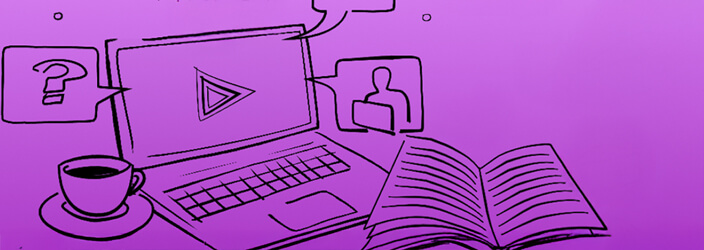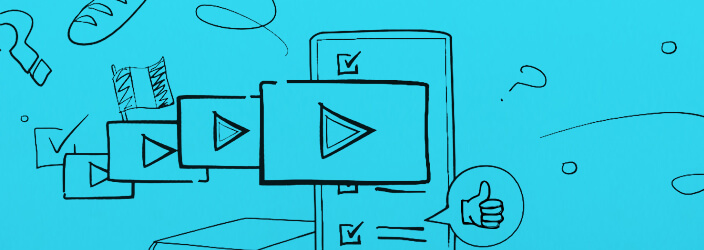Learning a language is no easy feat. Grammar can be confusing, building your vocabulary is often time-consuming, and understanding exactly how a language works in everyday use requires a good deal of immersion in the culture of your target language. French is no different from any other language in this regard. Fortunately, there are a number of ways you can optimise your studying to learn faster and more efficiently — and have fun while doing it!
That doesn’t mean there’s a wrong way to learn French. Different people learn in different ways. What works well for one person may be counter-intuitive for someone else — and vice versa. Familiarising yourself with a range of studying techniques and approaches is therefore essential for finding a groove that feels natural to you.
Luckily for you, in the world of 2025 there are more ways to learn French than ever before. With so many apps and language resources available at the touch of a button, you no longer need to rely on old textbooks and once-a-week language classes to learn to speak French like a native (although they can certainly help!).
Read on to discover some of the best ways to learn French in 2025.
Learn Passively
Why set your hobbies aside to study French when you can do both at the same time? Passive learning is when you imbibe information without taking an active role in studying it. In the context of learning French, a great example of passive learning would be listening to someone speaking the language — all you need to do is pay attention to what is being said.
The wonderful thing about passive learning is that it allows you to multitask. Studies have shown that you can broaden your vocabulary and improve pronunciation simply by having a French language podcast on in the background, or by listening to songs with French lyrics. You can even combine passive learning with some of your favourite pastimes across a range of media. Plenty of video games allow you to change the interface or audio language to French in the settings, and you can do the same on your phone, laptop, tablet and personal computer, turning every web search into a mini French lesson. You could even try watching your next movie with French subtitles — or alternatively, watch a movie with French audio and English subtitles. The possibilities are endless.
Set yourself goals
Mastering French won’t happen immediately, and progress will come one step at a time. That's why it's important to set yourself regular, achievable goals. First of all, this will help you break down your learning ambitions into manageable components. But secondly, and no less importantly, being able to tick things off the to-do list will continually provide you with the sense of progression you need in order to motivate you on your journey.
You might be thinking, if I don’t know French, how am I supposed to know what I need to learn? The good news is that almost all languages have the same basic components, such as different tenses, sentence structures and ways of asking questions. Mastering a language is mostly a case of mastering each of these components. But even if you’re teaching yourself, you can take inspiration from online French courses and classes, which have their own roadmaps designed to take students from one level to another. Alexa's Complete French Course, for example, takes students from A1 to C2 level, with each lesson covering key components such as the subjunctive or the uses of aller along the way.
Components aren’t the only way to orient your French language goals, however. You may find it more effective to set yourself time-based goals, such as studying for fifteen minutes, half an hour or an hour each day — or each week. The regularity of your goals is something you can set for yourself, and base around your schedule. What’s important is that you find something that works for you — and that you stick to it! Self-study allows more flexibility, but it’s all too easy to lapse without the discipline of having a teacher.
Learn nouns with their articles to remember the gender
The gender of nouns can be one of the more confusing aspects of learning French, especially for English speakers. Is it la table or le table? Le poisson or la poisson? Luckily, we have an easy way to remember.
When it comes to learning and memorising nouns, make sure you factor in the article as well as the noun. See the following example:
Lesson > leçon
The lesson > la leçon
Notice how we've included the article, so although 'lesson' strictly translates to leçon, you can tell that it's a feminine noun.
It can be tempting to omit the article, or you may simply forget, but stick to this method and before long you’ll be in the habit of prefacing le or la to any new nouns you learn, and remembering their gender will be simple! Just remember to take the article away again when you don’t need it!
Make your next read a French book
One of the best ways to learn French is to read! When it comes to books, few languages can boast a literary output quite on the scale of French literature. From Gustave Flaubert and Jean-Jacques Rousseau to Albert Camus and Simone de Beauvoir, French-language writers are renowned across the world, which makes French literature the perfect medium through which to learn the language and to enjoy some of the best parts of French culture at the same time.
The breadth of French literature also means there are plenty of novels, essays, poems and other writings for learners of all levels. So if you don't fancy diving into La Recherche du Temps Perdu, you can start with Le Petit Prince for something a little more accessible.
Buddy up
You don’t need to learn French alone. In fact, having a friend, colleague or relative to practise your French with is a great way to improve your grasp of the language, especially when it comes to speaking and listening.
If you know someone who’s also studying French, why not try having a conversation with them in the language? It doesn’t matter if you’re at a different level: holding a dialogue in French is fantastic practice, and you can help each other out with corrections, tips and suggestions for new words or phrases without the embarrassment of making mistakes in front of a native speaker.
Language exchanges are another brilliant way to improve your communication skills. Partnering up with someone who already speaks French at a native level, but who wishes to learn English (or another language you can speak), means you can trade expertise with one another, and be confident that you are both learning from a fluent, authoritative speaker. There are different ways you can do this, for instance holding a conversation in which you switch between languages every five minutes, or with each of you only speaking your target language. There are a number of great apps for this, such as HelloTalk and Tandem, and the good news is that languages such as English and French are always in high demand!
Learn in Context
To be truly fluent in French, you should aim to have over 5,000 words under your belt. Native speakers generally know up to 10,000, or even 20,000 at the upper end. Given these high numbers, it can be tempting to learn vocabulary by the quickest means possible.
Typically, this means memorising lists of words in isolation. But studies show that it's easier and more effective to learn words in context — that is, by putting the word in a sentence to see how it works, or reading or listening to a word as part of a bigger piece of text or part of a conversation. Having visual aids also helps tremendously, which is why we incorporate them into our vocabulary lists.
Context helps to create associations for the word in question, which in turn helps to anchor the word in your memory. Plus, by practising, reading or listening to a sentence as opposed to just one word, you're exposing yourself to even more vocabulary.
Think in French
Roughly a quarter of our waking life is spent thinking in words, as opposed to subconscious impulses. This means that for nearly 25% of the day, your mind is actively thinking in your native language. So why not start thinking in French?
Switching languages in your brain isn't quite as simple as that, and will require an active effort every time you put your mind to something. You will likely need to translate your thoughts from your native language first — but this is a great way to discover your limits and determine which words you still need to learn.
Ignore true cognates (or at least don't prioritise them)
We've mentioned that native speakers of French often know up to 20,000 words. Luckily, however, many of those words are what are known as 'true cognates'. While a 'cognate' is a word which is related to another word in another language (for example, 'compagnie' is cognate with 'company', and 'champion' is cognate with 'campagne', in that they share the same derivation but do not mean the same thing), a 'true cognate' is identical in spelling. In fact, there are around 1,700 true cognates in French — which means that even the complete beginner will already have a huge advantage if they can speak English.
The second advantage of this is that you won't need to put as much time into learning these words, since they're exactly the same — which will give you a lot more time to study other, less familiar words instead.
Be careful though! Some cognates’ meanings change slightly in French as opposed to English (for instance, 'librairie' means 'bookshop'; for a library you should use the word 'bibliothèque'). And some (known as 'false friends') have an entirely different meaning altogether. It’s worth checking the meaning of cognates before you dismiss them from your studies.
Our French courses
People all over the world are learning French online with Alexa Polidoro
















